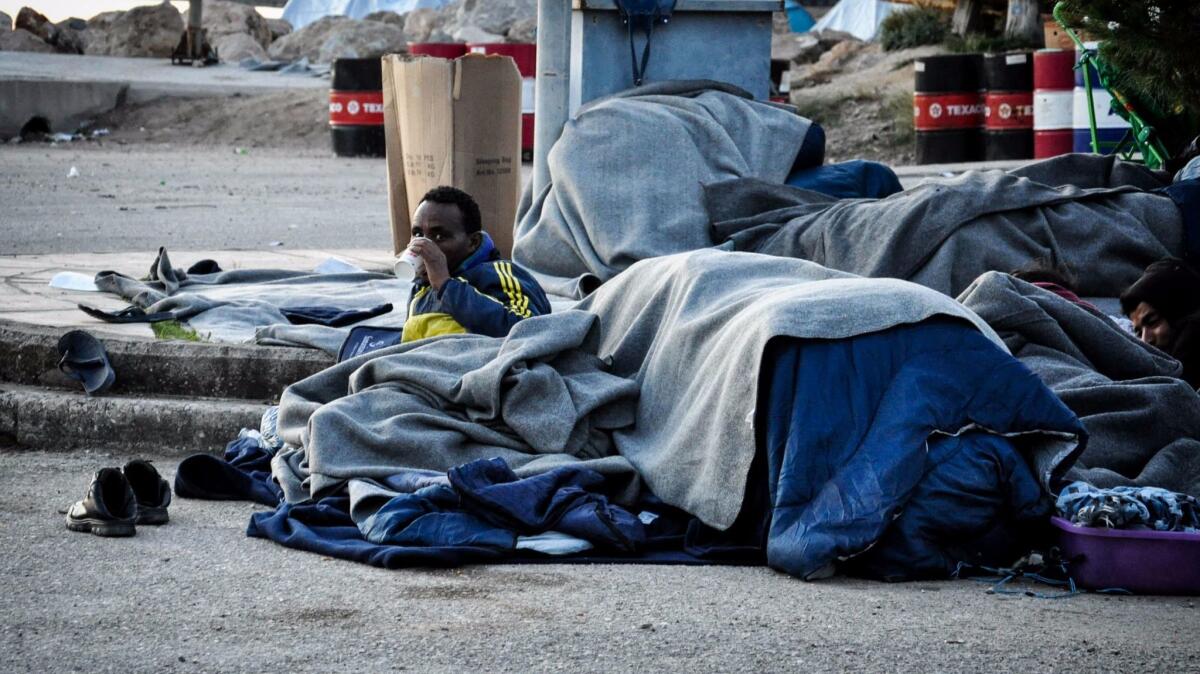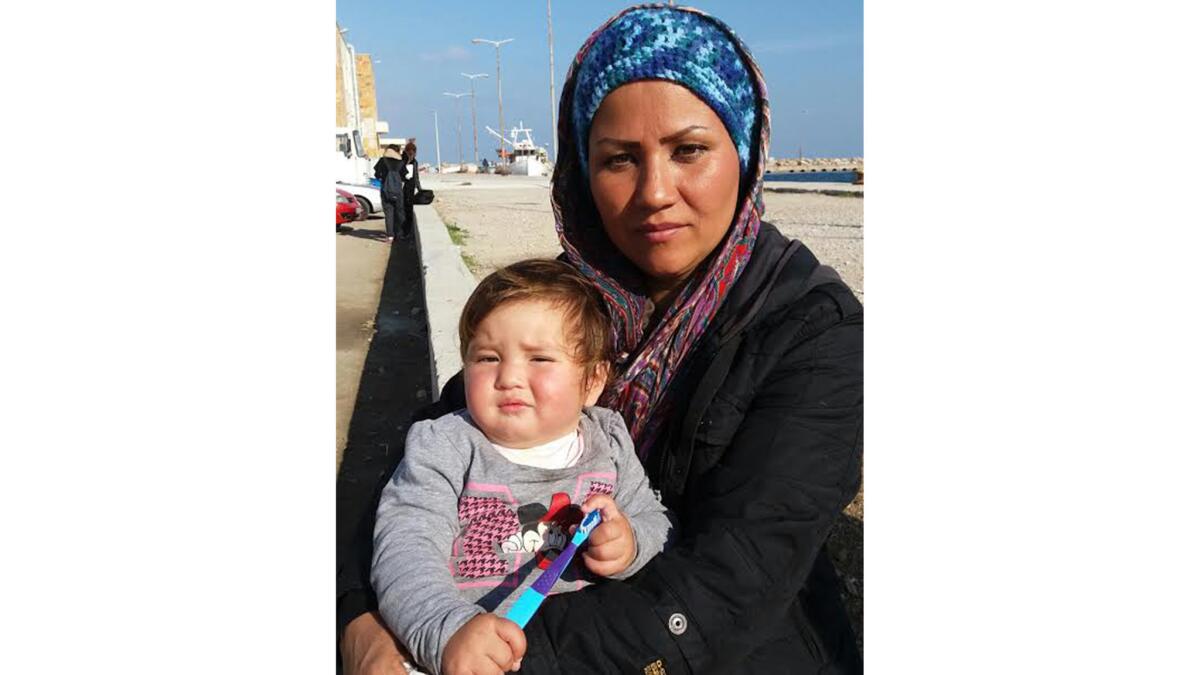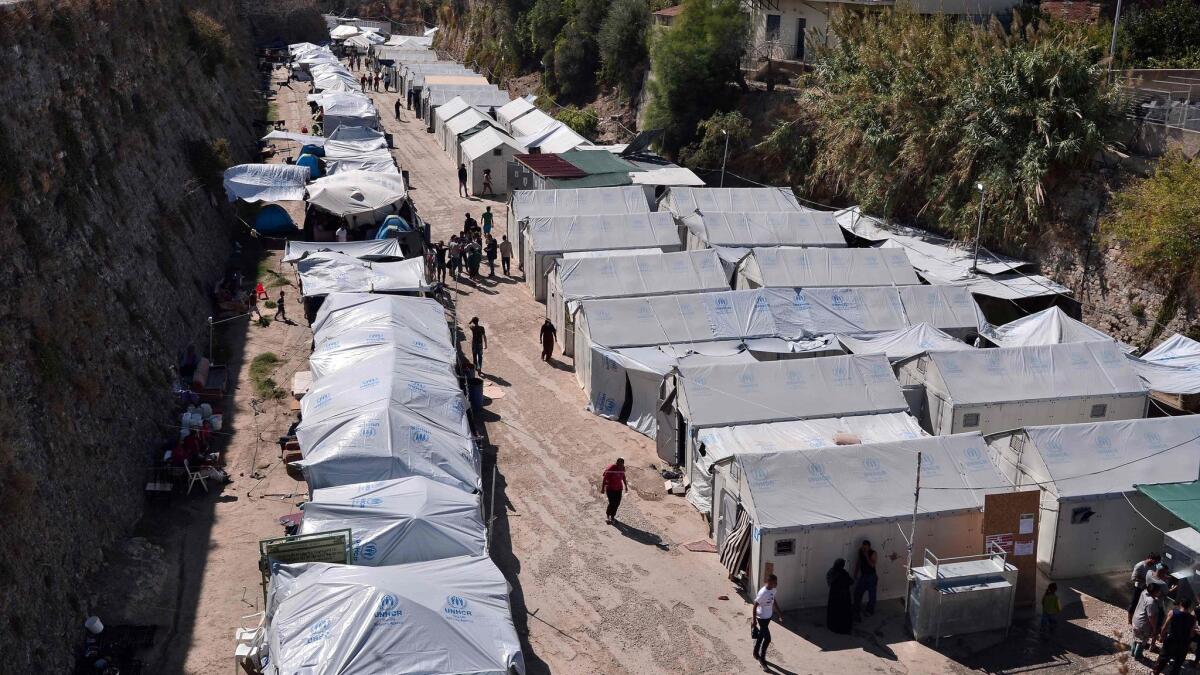Tension between refugees and Greek island residents puts pressure on the need for a long-term solution

- Share via
Reporting from CHIOS, Greece — Eleven-month-old Fatima Moshfeq spent more than half her short life in makeshift shelters outside the walls of a Greek castle that decades ago provided sanctuary to refugees like her.
But Fatima and her family fled the immediate area in mid-November after unidentified assailants standing on the Chios castle’s walls tossed heavy stones and pieces of concrete at the hundreds of refugees below.
“We just ran,” Fatima’s mother, Masoma Alemi, said recently.
The Afghan family, including Fatima’s two older brothers, ages 9 and 14, her father and grandfather, ended up in a parking lot not far from the castle but in an open space away from its walls. They, like thousands of other refugees seeking asylum in Europe, set up tents.
Some aid workers and officials say attacks have been orchestrated by a far-right anti-immigrant group that advocates “clean ethnic states.” Meanwhile, some residents say that the attacks came after refugees and migrants broke into local stores, and that there has been an increase in vandalism and robberies.

While substantial disagreement exists about what has caused conflicts, there is widespread agreement on one thing: The Greek islands are seeing growing tension.
Migration Policy Minister Ioannis Mouzalas has urged island residents to remain calm and has pleaded with European Union countries to boost asylum services and accept more refugees for relocation, both part of a March deal between the EU and Turkey. He also requested that the EU consider a Greek proposal to move asylum seekers — “migrants with infringing conduct or whose asylum claims are manifestly unfounded” — to specific locations on the mainland.
Although the deal has been hailed by some as a deterrent to the exodus of refugees and migrants from Turkey, a steady trickle of new arrivals in Greece, combined with the slow pace of asylum proceedings, has created a logjam on islands ill-equipped to cater to the needs of about 16,000 people, among them an estimated 6,000 children. The refugees and migrants on the Greek islands are among more than 60,000 in the country.
Asylum applicants must remain on the islands — Chios, Lesbos and Samos chief among them — while their requests are processed.
Families are housed in tents, often unheated, and sanitary facilities are shared in the makeshift centers; in some, women share shower facilities with men. There have been protests about the quality of food in the camps.
“Camps are never an ideal solution, especially not long term,” Alain Homsy, head of Greek operations for the Norwegian Refugee Council, one of the aid groups active in Greece, said in a statement this month. “Many of the camps in Greece are also far below humanitarian standards. There is an urgent need to ensure that people are moved into proper housing facilities, and that they receive necessary support, health services and education opportunities.”
Unrest in the camps, often between people of different nationalities, and reports of vandalism and thefts are stoking dissatisfaction among local communities on the islands, whose members have already seen their livelihoods — many in hotels, transportation services and restaurants — take a hit as tourism slumps. Aid groups say overcrowding and the delays are behind the tension and unrest in the camps.
Prime Minister Alexis Tsipras said last week that a planned increase in sales tax wouldn’t be applied in the islands of the north Aegean because they have shouldered the brunt of the impact of the migrant crisis.
Chios, one of the main islands on the front line of last year’s refugee exodus from Turkey, is the most crowded, according to the aid group Save the Children, with more than 4,000 people in accommodations designed for 1,000.
Chios Mayor Manolis Vournous said via email that the tolerance on the island has been exhausted. Vournous said fields and crops have been damaged by refugees and migrants near the government-run Vial camp, which refugees and observers have described as having poor living conditions.

During one recent morning in Chios, five Greek men clustered around the doorway of Theodoris Tsoukalas’ fish restaurant, not far from the parking lot where refugee families were camped. The men smoked, drank coffee and watched.
Tsoukalas said he was concerned about not attracting many customers. Violence in the area, including unrest in the camp, began before the stones were tossed at refugees, he said.
Some refugees at the parking lot sat cross-legged on mats behind a banner that indicated they wanted “to make peace with the Greek people.”
Jonathan Eccles, field manager for Save the Children in Chios and Samos, said many refugees have benefited from acts of kindness by residents, but not all.
“The majority of Greeks have been very supportive,” Eccles said in a phone interview. “The picture recently though has been one of increased tension.”
In Samos, Eccles said, a surge of refugee arrivals in October doubled the population in the detention centers — government figures in late November showed 2,600 people in accommodations designed for 850.
The Souda camp is minutes from the central square in Chora, the main town, nestled in what used to be part of the castle’s moat. In 1922, an influx of refugees from Turkey, ethnic Greeks fleeing persecution, found shelter in the castle. But the latest wave of refugees — Syrians mainly, but also Afghans, Iraqis, Kurds and north Africans — has been accommodated outside the fortress, now a protected archaeological site.
If new arrivals qualify to apply for asylum in Greece and for possible relocation to other European countries, they are allowed to move to mainland Greece. If they aren’t, they are ordered to return to Turkey, although they can appeal.
Both processes — applying for asylum and appealing — have been criticized as taking far too many months, leading to a surge in tension with the local communities and within the camps.
The number of asylum seekers who had left Greece under the relocation program for other European Union countries was 6,259 as of Wednesday, less than 10% of the agreed-to total of 66,400, said United Nations refugee agency spokesman William Spindler.
Humanitarian officials say conditions are taking their toll on the most vulnerable: the disabled, the elderly, families, pregnant women and children. Children, including those unaccompanied and those with disabilities, are forced to live in squalid conditions, exposed to disease and at risk of increased mental and physical health issues, Save the Children said.
“We need to move families and children to safe, open accommodations on the mainland,” Eccles said. “At the moment it’s clear it’s unworkable and unsustainable having them on the islands where there is no capacity to look after them in the right way.”
Alemi, who said her family feared for its safety in the Afghan capital, Kabul, has spent six months on Chios trying to obtain asylum in Europe. She said she has asked about their asylum request eight times and had yet to receive any news.
“I don’t want to be with troublemakers,” she said, holding Fatima close as she recalled the stones being thrown from the castle. “That night I didn’t know where to go — there were no lights, everyone was screaming. I didn’t know where to go for safety.”
Petrakis is a special correspondent.
MORE WORLD NEWS
Beijing lost its crown as the bicycle king. Some well-funded startups want it back
The world could wipe out malaria. A new report shows why that isn’t happening
More to Read
Sign up for Essential California
The most important California stories and recommendations in your inbox every morning.
You may occasionally receive promotional content from the Los Angeles Times.









